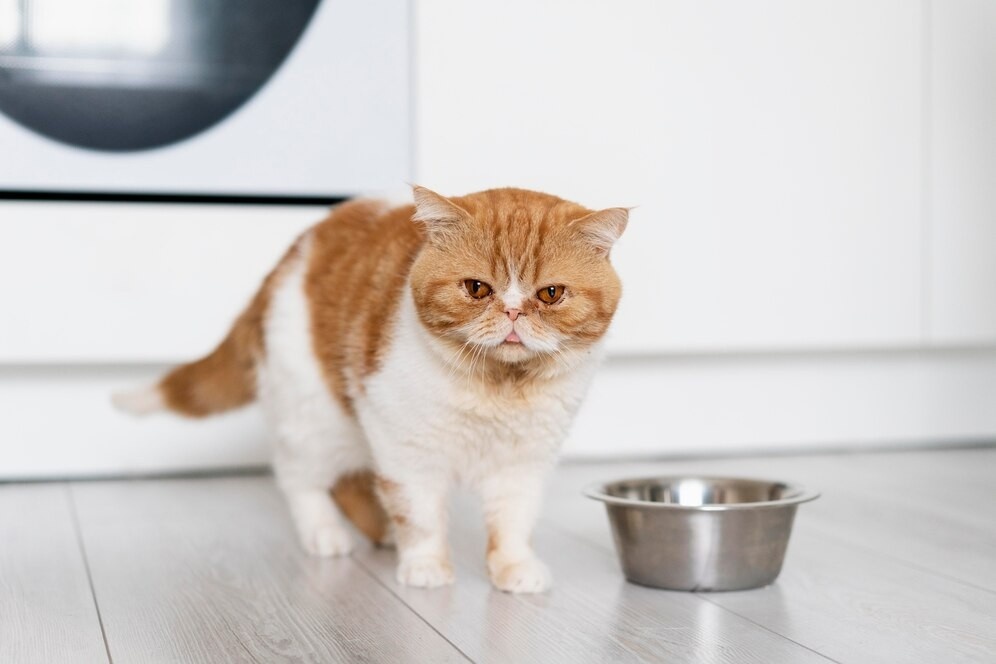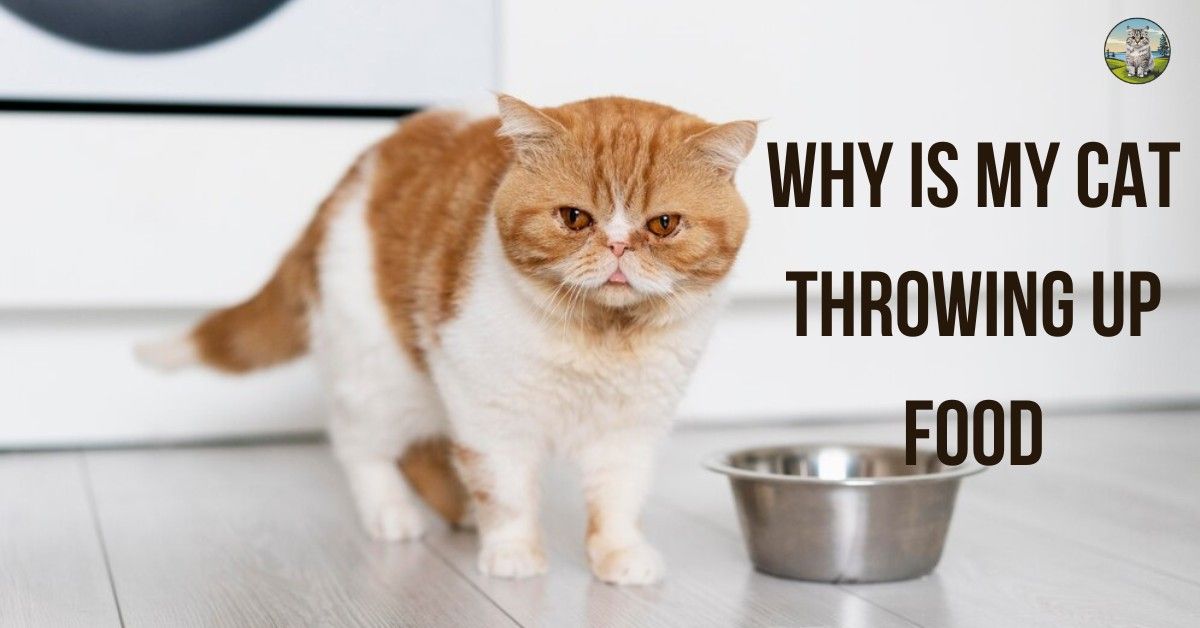Why is my cat throwing up food? Cats are known for their finicky eating habits, but when your cat starts throwing up food regularly, it can be worrisome. Vomiting can happen occasionally, but when it becomes a frequent issue, it’s time to explore potential causes. This article will delve into why your cat might be throwing up food, the possible health concerns, and how you can help them.

Why Would My Cat Be Throwing Up?
Cats can throw up more often than you might expect. But before you panic, it’s essential to understand the potential causes. Occasional vomiting may not be a cause for concern, but repeated episodes could indicate something serious. So why would your cat be throwing up?
Dietary Indiscretion: Cats sometimes eat too quickly or consume things they shouldn’t, like spoiled food or foreign objects, which can cause vomiting.
Food Allergies: Cats may develop sensitivities or allergies to certain ingredients in their food, leading to stomach upset and vomiting.
Infections or Parasites: Gastrointestinal infections or parasites can cause nausea, leading to vomiting.
Hairballs: Hairballs are a common reason for cats vomiting. When a cat grooms itself, it may swallow fur, which can lead to blockages in their digestive tract.
Why is My Cat Throwing Up Undigested Food?
If your cat is throwing up undigested food, it’s essential to pinpoint when the vomiting is occurring. Is it immediately after eating or several hours later?
Eating Too Fast: A cat that eats too quickly may vomit undigested food because the stomach cannot handle such rapid intake. This is known as regurgitation, not vomiting, and happens when the food has not reached the stomach yet.
Gastritis or Inflammation: When the stomach lining becomes inflamed due to infections or irritants, your cat may vomit undigested food.
Blockages: Blockages in the digestive tract, caused by ingesting foreign objects, tumors, or severe constipation, may result in undigested food being thrown up.
Why is My Cat Throwing Up Her Food or His Food?
Gender doesn’t generally play a role in why cats vomit, but it’s essential to understand the underlying issues that could cause either male or female cats to throw up food.
Dry Food Issues: Many cats have trouble digesting dry food, especially if they eat it too fast. If your cat is throwing up her dry food specifically, it may be because the kibble is expanding in her stomach, causing discomfort.
Food Sensitivity: Male or female, if your cat is sensitive to a particular ingredient in their food, this can trigger vomiting episodes.
Age-Related Changes: As cats age, they may experience reduced digestive efficiency. Older cats may vomit more frequently due to conditions like kidney disease or hyperthyroidism.
Why Does My Cat Constantly Throw Up Undigested Food?
Daily vomiting of undigested food is a red flag. If your cat is throwing up every day, it’s time to consult a veterinarian.
Chronic Gastritis: Ongoing inflammation in the stomach lining can cause cats to vomit undigested food daily. This can be triggered by infections, dietary intolerance, or the ingestion of irritating substances.
Underlying Illnesses: Conditions like kidney disease, liver disease, diabetes, or gastrointestinal disorders can lead to chronic vomiting.
Stress and Anxiety: Cats are sensitive creatures, and stress can manifest in physical symptoms like vomiting. Changes in the environment or routine can cause daily vomiting episodes.
Why is My Cat Throwing Up Her Dry Food?
Dry food can sometimes be more difficult for cats to digest than wet food. If your cat is throwing up her dry food, consider the following factors:
Poor Hydration: Cats are naturally low water drinkers, and eating dry food without enough water intake can lead to dehydration and vomiting.
Size of the Kibble: Large kibble pieces can be challenging for some cats to chew and swallow properly, leading to vomiting shortly after eating.
Switching Foods Too Quickly: If you’ve recently switched to a new brand of dry food, the sudden change might upset your cat’s stomach.
Why is My Kitten Throwing Up Food?
When kittens throw up, the causes can be similar to adult cats, but their young age adds extra concerns.
Overeating: Kittens are often enthusiastic eaters, and overeating can lead to vomiting, especially if they consume too much food too quickly.
Developmental Issues: A kitten’s digestive system is still maturing, and they may be more prone to gastrointestinal disturbances that lead to vomiting.
Parasites: Kittens are more likely to suffer from parasites like roundworms, which can cause nausea and vomiting.
Why Does My Cat Keep Throwing Up Her or His Food?
If your cat keeps throwing up her or his food repeatedly, you may need to consider more chronic issues.
Food Intolerance or Allergies: Some cats may develop food allergies to ingredients like grains, chicken, or dairy. Switching to hypoallergenic food can help alleviate the problem.
Inflammatory Bowel Disease (IBD): IBD can cause chronic vomiting as the lining of the stomach becomes inflamed, leading to issues with digestion.
Hyperthyroidism: A common issue in older cats, hyperthyroidism can cause increased appetite and vomiting. Cats with this condition may eat a lot but vomit frequently due to the hyperactivity of their metabolism.
Why is My Cat Throwing Up Every Day?
Daily vomiting, especially if it continues for more than a day or two, is not normal and should be addressed by a vet.
Chronic Conditions: Diseases like liver disease, kidney failure, or cancer can cause vomiting every day as the organs fail to process toxins or nutrients properly.
Severe Parasite Infestation: A heavy load of intestinal parasites can cause your cat to vomit daily. Regular deworming and vet check-ups are essential for preventing this.
Poisoning or Toxins: Accidental ingestion of toxic substances, including certain plants, household cleaners, or human foods like chocolate, can lead to frequent vomiting.
Conclusion
If your cat is frequently throwing up food, it’s essential to take the situation seriously. Occasional vomiting might be due to minor reasons like eating too fast or hairballs, but daily or frequent vomiting is often a sign of a more serious underlying issue. Whether it’s related to food allergies, chronic illness, or something as simple as dry food, it’s important to monitor your cat’s behavior and seek veterinary advice when necessary.
By taking steps like offering smaller meals, providing fresh water, and ensuring your cat’s diet suits their needs, you can reduce vomiting incidents. If the problem persists, consulting a veterinarian is crucial to rule out any severe health conditions and ensure your cat’s well-being.
Frequently Asked Questions (FAQs)
1. What is the best way to stop my cat from vomiting?
You can help prevent vomiting by offering smaller, more frequent meals, using a slow feeder bowl, and ensuring your cat stays hydrated. If dry food is the issue, try switching to wet food or a hypoallergenic diet.
2. Is it normal for a cat to vomit hairballs?
Yes, occasional hairball vomiting is normal. However, if your cat vomits hairballs frequently, it could indicate excessive grooming or gastrointestinal issues.
3. When should I take my cat to the vet for vomiting?
If your cat is vomiting more than once a day, for several days in a row, or if the vomiting is accompanied by other symptoms like lethargy, diarrhea, or weight loss, it’s time to visit the vet.
4. Can stress cause my cat to vomit?
Yes, stress can lead to vomiting in cats. Changes in the household, new pets, or disruptions to their routine can trigger vomiting as a physical response to anxiety.
5. Can I give my cat medication for vomiting?
Never give your cat medication for vomiting unless prescribed by a veterinarian. Human medications can be toxic to cats, and over-the-counter treatments for vomiting may not address the underlying issue.


